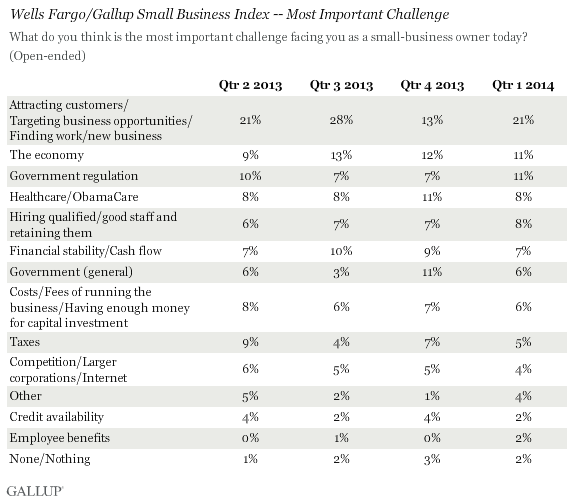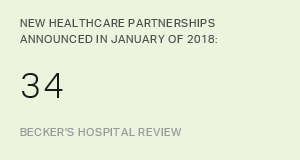WASHINGTON, D.C. -- U.S. small-business owners are most likely to say that attracting more customers and business, a traditional business concern, is the most important challenge they face today, with 21% of small-business owners mentioning this challenge. They also name challenges associated with the economy in general (11%), government regulation (11%), healthcare issues (8%), and hiring and employee retention concerns (8%).

These results are from the Jan. 6-10 update of the Wells Fargo/Gallup Small Business Index, based on telephone interviews with 603 small-business owners. This survey reflected a significant uptick in small-business owners' optimism for both their businesses' current situation and the future. But, this poll shows that owners continue to face a wide array of challenges that they need to overcome to survive and thrive in today's highly competitive business world.
Small-business owners' responses to the question asking about their most important challenge have varied some from quarter to quarter, but generally have reflected the same broad types of concerns over time. The basic challenge of finding customers and new business has consistently been small-business owners' top concern, although fewer owners mentioned it in the fourth quarter of 2013. Small-business owners' other more direct operational concerns include hiring qualified staff, cash flow, having enough money for capital investment, and competition.
Small-business owners also mention a number of concerns representing factors that are essentially out of their day-to-day control. These include the economy, government regulation, healthcare, the government in general, and taxes.
Implications
The good news this year surrounding the highly vital small-business component of the U.S. economy is that small-business owners have grown significantly more optimistic.
The more sobering news, however, is that these small-business owners continue to operate in a highly challenging business environment. Not surprisingly, owners are primarily focused on the challenge of growing their businesses, including finding new customers, hiring and retaining the right staff, and dealing with the competition. At the same time, these owners are also challenged by the broad economic and regulatory environment in which they must operate -- including the direction of the economy, government regulations that affect their ability to prosper, and healthcare policies. Small-business owners have less control over these factors.
President Barack Obama lauded the value of small businesses in his State of the Union address in January and announced a number of initiatives that his administration believes will help small businesses grow and thrive in the years ahead. At the same time, some small-business owners could view the president's signature healthcare legislation and his push for a federally mandated minimum wage increase as potentially deleterious to business. More broadly, many small-business owners are apparently wary of the current impact of the government on their businesses, thus presenting both a challenge and an opportunity for the president and others who want to positively impact small businesses going forward.
About the Wells Fargo/Gallup Small Business Index
Since August 2003, the Wells Fargo/Gallup Small Business Index has surveyed small-business owners on current and future perceptions of their business financial situations. Visit the Wells Fargo Business Insight Resource Center to access the full survey report and listen to Wells Fargo's quarterly Small Business Index podcast.
Survey Methods
Results for the total data set are based on telephone interviews conducted Jan. 6-10, 2014, with a random sample of 603 small-business owners, living in all 50 U.S. states and the District of Columbia.
For results based on the total sample of national adults, the margin of sampling error is ±4 percentage points at the 95% confidence level.
Sampling is done on a random-digit-dial basis using Dun & Bradstreet sampling of small businesses having $20 million or less in sales or revenues. The data are weighted to be representative of U.S. small businesses within this size range nationwide.
In addition to sampling error, question wording and practical difficulties in conducting surveys can introduce error or bias into the findings of public opinion polls.
For more details on Gallup's polling methodology, visit www.gallup.com.
